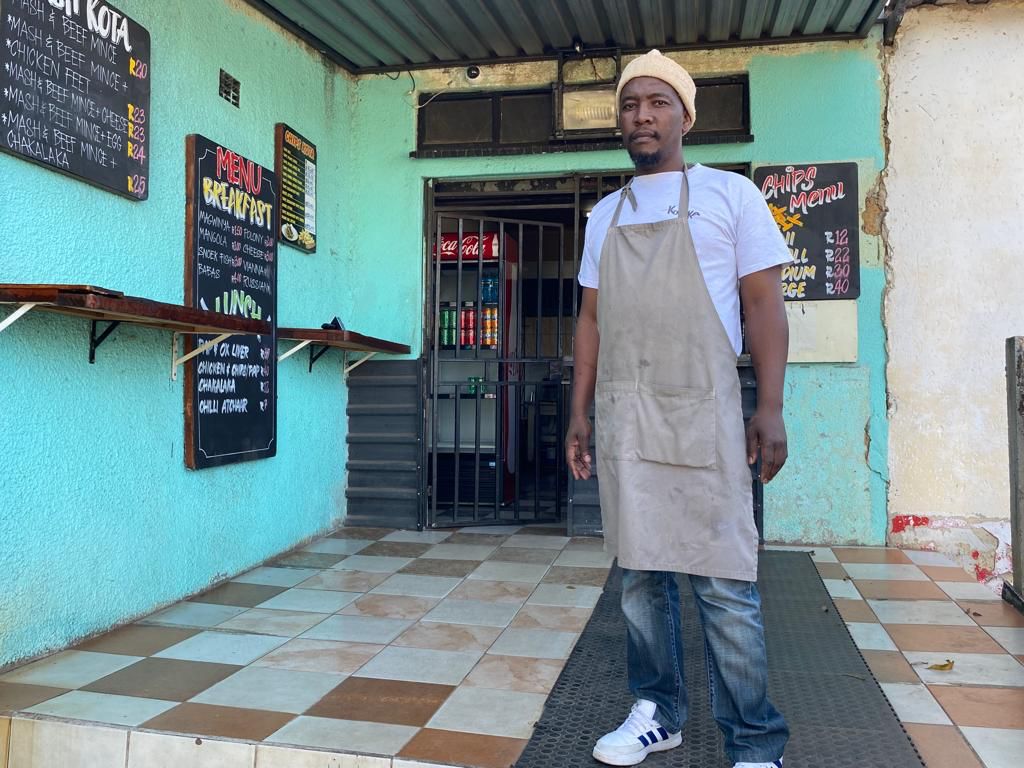Ali Maphisa has been running a business in Soweto for 10 years. [Picture: Abraar Shaikh]
In the bustling township of Soweto outside Johannesburg, Ali’s Kitchen stands out amidst sizzling takeaway popups. Ali Maphisa sat down with Salaamedia to share his story.
Maphisa was born into a devout Christian family; raised with firm values and had a religious upbringing. But his life quickly slid into chaos, resulting in his incarceration before he could make anything of his adult life.
Languishing in a prison, Maphisa soon became intrigued by the Islamic way of life. As he learnt more about the religion, misconceptions were debunked and enlightenment took hold in his heart. In 2001, he accepted Islam.
“One of my friends introduced me to Islam. I was curious because when I was outside, I thought Islam is a foreign religion. I started reading and became interested. I had a background and I could see that this thing relates,” he said.
Maphisa was surprised to find out that many of the important figures in Islam matched with those in Christianity – Prophets Ibraheem (AS) and Eesa (AS) to name but two. His parents were shocked about the conversion, he said.
When released on parole in 2012, Ali finally got to meet Muslims outside of prison. This exposure added a whole new dimension to his experience, with many inquisitive bodies in his community curious to learn more about why he accepted Islam.
“I wanted to change my life. Islam showed me a different perspective about life – it completely changed me. Honestly, there’s no rehabilitation programme that has done what Islam done to me. I saw the world in a different [light],” he said.
SMread: Siddiqui sisters meet after 20 years
But one of the harsher, inescapable facts of reality soon hit: he needed to find an income. The problem here was that his name was tainted by a criminal record, meaning jobs in an already struggling economy were hard to come by.
“Me having a criminal record, the chances of getting employment was next to zero. That’s when I [thought] what can I do? One of the brothers told me about SANZAF funding businesses.”
“The initial business idea I had was not a food business.” but someone told me there’s no halal food in Soweto,” he said.
Some time in 2013, Maphisa was fortunate to obtain 40% capital funding for a start-up business from the South African National Zakah Fund (SANZAF). This did not fall into his lap. He recalls having to prove that he was in fact a Muslim.
After getting the grill sizzling, Maphisa took a long road towards success. “Some of the people would ask, ‘Who is Ali?’” he said, about sceptical locals who suspected he was operating for an Indian in a predominantly Black township.
That was not the only challenge in Maphisa’s way, however. In ten years of serving the local Muslim community, his business withered the Covid-19 pandemic, rolling black outs and more rolling black outs. The latter is a persistent issue.
“If it wasn’t for the persistence and the support of my wife, maybe I [would] have closed the business a long time ago. I even took a decision that more than anything, it’s a service to serve Muslims halal food. That’s the thing that keeps me going.”
With this, Maphisa believes he can continue on his mission to provide halal food to the Soweto community. He also strongly encourages youth in South Africa to educate themselves about how to run a business so they can sustain themselves.
Watch Ali Maphisa’s story here:
View this post on Instagram
